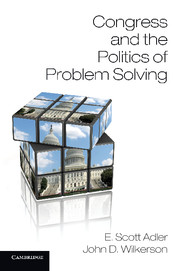Appendix B - Assignment of Bills across Issue Types
Published online by Cambridge University Press: 05 January 2013
Summary
Compulsory Issues
Recurring. These are policy areas where a lack of legislative action shifts the policy from the status quo to a different reversion point. These bills include appropriations as well as those that renew expiring laws or legislative provisions.
Coding: As discussed in Chapter 5, bills are identified as “recurring” in a multistep process. Using bill titles (generally a sentence or two in length) and bill summaries (ranging from one sentence to multiple paragraphs) available through the Library of Congress THOMAS Web site (www.thomas.loc.gov), a search is conducted on all bills for a list of keywords or keyword combinations (e.g., “appropriat*,” “reauthor*,” “authorize appropriations for FY”). The list of keywords was, in some cases, quite complicated (e.g., word combinations within the same sentence but not necessarily sequential) and was drawn from earlier case-by-case investigations of the titles and summaries of known reauthorizations and appropriations bills. Approximately one thousand bills were tagged in this way each term and were then individually inspected to eliminate false positives. In instances where a careful read of the title and summary still left uncertainty as to its appropriate coding, the full text of the bill was examined along with its legislative history found in CQ Almanac and Lexis-Nexis Congress. To reduce the chances of false negatives, we conducted a final search for mentions of (missed) reauthorizations in the online CQ Almanac.
- Type
- Chapter
- Information
- Congress and the Politics of Problem Solving , pp. 214 - 215Publisher: Cambridge University PressPrint publication year: 2013
- 5
- Cited by



